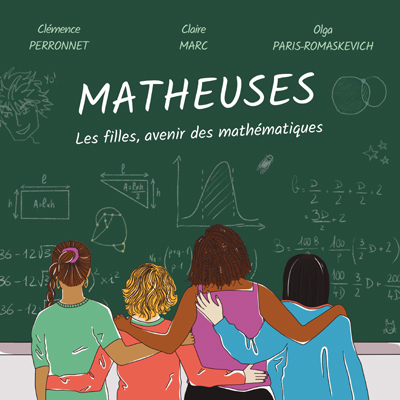Monday 11 February marks the 10th consecutive International Day of Women and Girls in Science. It's an opportunity to remember the importance of promoting equal access and participation in science for all. And to find out about the initiatives taken by ENS de Lyon to encourage more women to take up science, particularly in fields where they are under-represented.
Tuesday 11 February marks the 10th consecutive International Day of Women and Girls in Science. It's an opportunity to remember the importance of promoting equal access and participation in science for all. And to find out about the initiatives taken by ENS de Lyon to encourage more women to take up science, particularly in fields where they are under-represented.
Cécile Dewitt-Morette Program

ENS de Lyon wishes to act on the factors that limit access to scientific careers for women and to combat the resulting under-representation of women in science. Since the last high school reform in France, the number of girls with a double major in science has fallen sharply. At ENS de Lyon, female students in these fields account for less than 10% of the student body, and this under-representation has worsened in recent years.
The School is therefore launching the Cécile DeWitt-Morette program, which will fund the four-year studies of female students admitted to the ENS de Lyon degree program as of the start of the 2025 academic year. The aim is to encourage young women to apply, with the guarantee that if they are accepted, their studies at ENS de Lyon will be paid for.
For more information (press release in French)
Cécile DeWitt-Morette (1922-2017)
French physicist and mathematician. After working in the laboratory headed by Irène Joliot-Curie and Frédéric Joliot, in 1948 she joined the Institute for Advanced Studies in Princeton. While spending the rest of her career in the United States, she played a decisive role in rebuilding physics research and science education in post-war France. In 1951, she founded the École de physique des Houches, a summer school that welcomed many future Nobel Prize winners, and which she directed until 1972. The ENS de Lyon is one of the co-sponsors of the École des Houches. Cécile DeWitt-Morette's commitment has led her daughters to agree to give her name to the ENS de Lyon program.
Support for female doctoral students
Mentoring with the Femmes & Sciences association
The ENS de Lyon will be the pilot institution for launching the Rhône Alpes region's version of the national mentoring programme created by the Femmes & Sciences association. The aim is to provide individual support for female doctoral students, so that they can build their professional career plans with trusted and experienced people.
New equality plan
The Equality Plan 2024-2026 covers the entire career path. A number of measures relate specifically to the recruitment and career development of female faculty members. Particular attention is being paid to gender bias, to which members of the various selection committees will be made aware. Applications from female faculty members are encouraged throughout their careers. The plan also includes specific training initiatives for candidates for the HDR (Habilitation à diriger des recherches) awarded by ENS de Lyon.
Science, a woman's profession #9

The ambition of the annual ‘Sciences, a woman's profession’ event organised, with strong support from the ENS de Lyon, since 2017 is to show with examples that all scientific careers are open to men and women, to decipher stereotypes and to overcome preconceived ideas. This event, supported by the Femmes & Sciences association, the LabEx ASLAN and the ICAR and CRAL reseach units, brings together nearly 500 secondary school girls from the Lyon Academy to convince them to have confidence in their ability to succeed.
Symbolically, the event is usually held around 8 March, on International Women's Day. This year, it is organised on Tuesday 11 March 2025 for the 9th edition of "Science, a woman's profession".
All the events
Women and science: between passion and disaffection
On 14 February, the Part-Dieu municipal library will be hosting the conference ‘Women and science: between passion and disaffection. Towards greater equity on Wikipedia and in science’, with a contribution by Florence Françon, Head of Equality at ENS de Lyon.
Interdisciplinary conference to combat Sexual and Gender-Based Violence in higher education
The ComUE Université de Lyon and the inter-institution network for equality missions and the fight against sexual and gender-based violence (SGBV) are organising the first Lyon Saint-Étienne conference from 17 to 20 February 2025. ENS de Lyon will be hosting the conference on Wednesday 19 February on the theme of dealing with gender-based and sexual violence in research.
Wikipedia editathon
In order to combat the invisibility of women in science, the Equality Mission at ENS de Lyon is organising a ‘marathon’ to edit biographical notes on women researchers, on Thursday 27 February. The session will be led by Delphine Montagne, Wikimedian in residence at the URFIST in Lyon.
Publication
Clémence Perronnet, sociology meets mathematics... and women mathematicians

In 2023, was published Matheuses. Les filles, avenir des mathématiques (Girls, the future of mathematics), the result of a collaboration between three young scientists: Clémence Perronnet, Claire Marc and Olga Paris-Romaskevich. Based on a sociological survey of fourty-five 16-year-old girls who took part in mathematics courses, the book examines inequalities in mathematics and computer science, with a view to combating them more effectively.
Clémence Perronet is affiliated with the Max Weber Center, where she defended her PhD thesis, directed by Christine Détrez, in 2018. A specialist in the sociology of culture, education, science and gender, her research explores the links between social inequalities and the construction of taste, practices and commitments to science.






